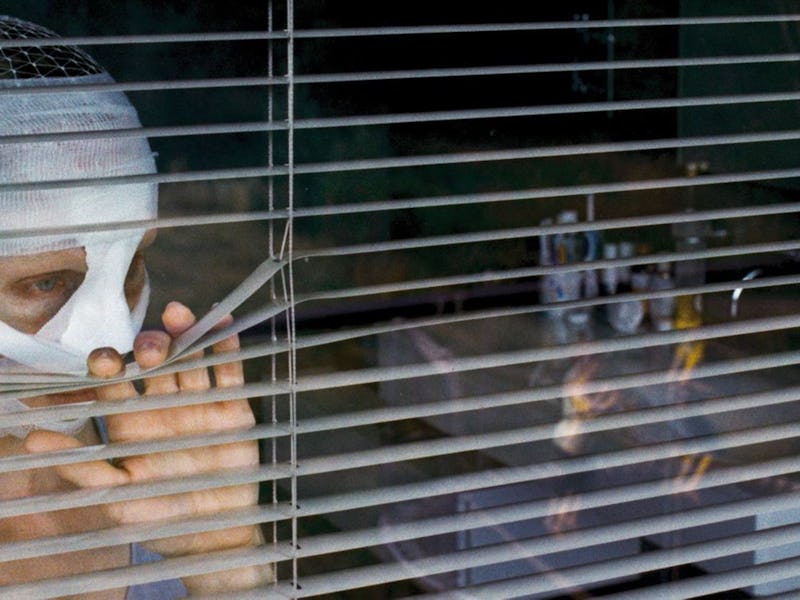'Goodnight Mommy' Is Not the Demonic Horror Film You Were Hoping For
The macabre, darkly comic Austrian thriller hints at deeper themes, but doesn't go much further.

Austrian horror film Ich seh, ich seh (more widely known as Goodnight Mommy) has gotten more buzz than the filmmakers could have reasonably expected. Its trailer went viral and was in itself deemed the scariest film of the year. The clip both reveals too much and nothing about the film: It gives away some of the movie’s central and most haunting images, but also cunningly misconstrues its plot.
The use of this tactic is understandable, given that this is a film which is structured around a series of twists, very much in the M. Night sense. If you’ve seen the trailer, these unexpected pivots will make the film proper more jarring, but also, probably, disappointing. This is not a traditional horror movie, horror movie fans. It is not a grisly tale of a woman with a creepy facial reconstruction-in-process who is possessed by a demon spirit as the trailer (and first half of the film) implies. In the end, Goodnight Mommy is a perverse meditation on grief and loss, and (in a Michael Haneke sort of way) a portrait of the darkest inclinations of the human soul — those that only manifest themselves in extreme circumstances.
The first half of the film is seen from the perspective of two twins, Elias (Elias Schwarz) and Lukas (Lukas Schwarz), whose mother (Susanne Wuest) arrives home with her face bandaged over. It becomes clear that the procedure she underwent was not cosmetic, but the result of an “accident.” She is irritable, and harshly chastises the boys, staying in her room for hours upon end. She wanders into the woods in the middle of the night. After finding an old family photo of her with a woman who looks very similar to her, the boys conclude that this seeming antichrist is not their mother. They suspect her of killing their cat. They start to retaliate against her; she locks them in their room for a day and night.
Warning: The ensuing paragraph will reveal integral information about the plot that may reduce your enjoyment of the film if you have not seen it.
When she eventually comes to release them, with her facemask gone, she apologizes; soon, it becomes clear to us that this woman is in fact their mother. But the boys continue to lash out, attempting to run away from home and then eventually tying her up and torturing her for information about the whereabouts of their true mom. As she weeps while being slowly mutilated, the true picture is thrown into relief: The boy Elias is hallucinating his twin brother Lukas, who was killed in the “accident” that deformed his mother’s face. The imaginary Lukas is a malevolent influence on Elias, conjured up out of his grief, who is pushing him to dead-eyed brutality. Likewise, it becomes poignantly clear that the mother is simply attempting to repent for her misguided actions in the first half of the film. As Elias refuses to listen, and the film devolves into increasingly sadistic violence, the scenario becomes almost poignant: Both Elias and the mother have been prisoners of their own misery, but by now, there is no way out.
Okay, you can resume now.
The slow-burn pacing in the film accommodates plenty beautiful imagery of the Austrian countryside — often eerie, peppered with burnt fields and strange marshland. But there are also plenty of slow scenes which feel like treading water. The moment Elias and Lukas decide to declare full-on war on their mother feels a bit unjustified, despite the time that is taken to build up to it. When the twins launch into offense mode, the move feels awkward — an abrupt shift from Kubrickian tension into shock tactics.
As we are kept at such a distance from the characters’ psychology, the film, which is clearly intended to be more than a horror film, feels like a vehicle for its twists, which in themselves feel disappointing in the context of the film. The Sixth Sense-ish reveal of “Lukas” — which prompts the viewer to mentally backtrack to access its logic — is intended to make a deeper thematic point, but feels just as much like an easy and somewhat unsatisfying explanation for the bizarre action that has led up to it.
Ultimately, the film builds an almost suffocating amount of anticipation; mini-climaxes are replaced with twists that function like self-congratulatory bait-and-switches. The net result of all this is that the final horrifying conflagration feels overblown and practically untenable, leaving one feeling colder and more skeptical than we are meant to, and nowhere near as scared. So as a horror film, Goodnight Mommy certainly feels like a half-gesture, and as a fanciful, almost magical-realistic exploration of post-traumatic psychosis, it falls short of engaging with the viewer on an emotional (or even gut) level. We are left with something that feels a bit like an inspired outline in search of a more powerful film.
Goodnight Mommy, which is Austria’s nominee for Best Foreign Film at the Academy Awards, opens on Friday at theaters everywhere.